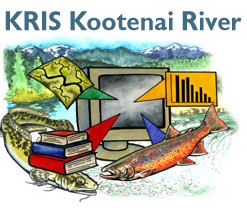Bibliography Background About KRIS
KRIS Kootenai Sponsors and Cooperators

The Kootenai River Network (KRN) is a non-profit organization that has as its goal the improvement of water quality and aquatic resources of the Kootenai River. KRN is a diverse group individuals, business and industry, tribal and government natural resource management agencies and private organizations in Montana, Idaho and British Columbia. KRN funded the pilot KRIS Kootenai project to further its objectives and in the hope that a future project will capture all data necessary for adaptive management of the Kootenai River in the United states and Canada.
 Kootenai Tribe of Idaho
Kootenai Tribe of Idaho
The Kootenai Tribe carries out or sponsors numerous studies of the Kootenai River and several can be found in the pilot KRIS Kootenai project. These include water quality studies, fisheries field investigations and hatchery reports. The latter reports reflect the active role the Kootenai Tribe plays in recovery of species like white sturgeon. The Tribe also commissions studies that delve into health of sub-basins, such as Trout Creek, where it is coordinating a restoration project.

Idaho Department of Fish and Game
The Idaho Department of Fish and Game conducts scientific investigations exploring the health of the Kootenai River and its fisheries. Reports and data in the pilot KRIS Kootenai project include information on burbot, westslope cutthroat trout, rainbow trout, bull trout and white sturgeon.

Montana Department of Fish, Wildlife and Parks
The Montana Department of Fish, Wildlife and Parks publishes an annual report on mitigation for the operation of Libby Dam, which provides excellent fisheries data used in the pilot KRIS Kootenai project. Data represented are from gill net samples, electrofishing, fish traps and redd surveys.
 U.S. Fish and Wildlife Service
U.S. Fish and Wildlife Service
The U.S. Fish and Wildlife Service Northwest Montana Partners in Wildlife Program provided pictures of restoration projects of Therrault Creek and Graves Creek, including spatial data indicating locations of projects.
 Kootenai National Forest
Kootenai National Forest
The Kootenai National Forest provided spatial data for the pilot KRIS Kootenai project.
Idaho Panhandle National Forest
Sediment data in KRIS were provided by the Idaho Panhandle National Forest.
Interior Columbia Basin Ecosystem Management Project
The pilot KRIS Kootenai Map project benefited greatly from the huge library of spatial data assembled by the Interior Columbia Basin Ecosystem Management Project. Spatial data layers assimilated include ownership, land use, mine locations, geology and others.

U.S. Geological Survey (USGS)
Streamflow data for the Kootenai River and tributaries in the United States comes from U.S. Geological Survey (USGS). The USGS publish daily average discharge, monthly average discharge, and annual peak discharge records from streamflow gages throughout the United States.
 Water Survey of Canada (WSC)
Water Survey of Canada (WSC)
Streamflow data for the Kootenai River and tributaries in Canada come from the Water Survey of Canada (WSC). The WSC publish daily average discharge, monthly average discharge, and annual peak discharge records from streamflow gages throughout Canada.
![]() Western Regional Climate Center
Western Regional Climate Center
The Western Regional Climate Center (WRCC) is one of six regional climate centers in the United States. The Regional Climate Centers Program is administered by the National Oceanic and Atmospheric Administration. Data include monthly average air temperature, monthly average snowfall, and monthly average and annual precipitation quantities and extremes.
 Conservation Technology Support Program and ESR
Conservation Technology Support Program and ESR
The Conservation Technology Support Program, with the support of the Earth Science Research Institute (ESRI), awarded a grant for hardware and software to the Institute for Fisheries Resources (IFR), which made it possible to assemble the KRIS Kootenai project. The Conservation Technology Support Program (CTSP) annually awards grants for equipment, software and training to tax-exempt conservation organizations to build their Geographic Information Systems (GIS) capacity.

American Fisheries Society
The American Fisheries Society (AFS) allowed inclusion of some of its journal articles in the KRIS Bibliography. AFS has posted recent journals on the internet, and the entire contents of these journals are available with a subscription. Article abstracts may be viewed at no cost. All AFS journal articles in KRIS are still fully covered by copyright and may not be re-used without written permission from AFS.
